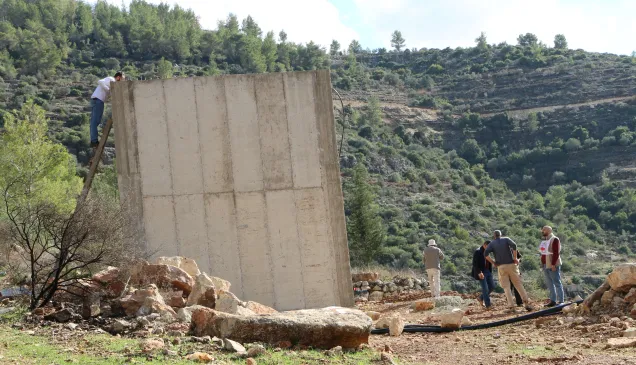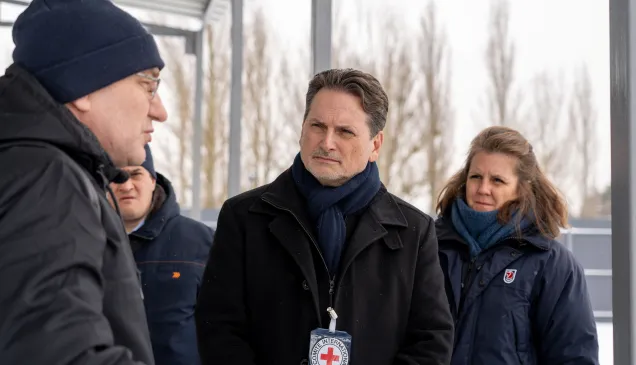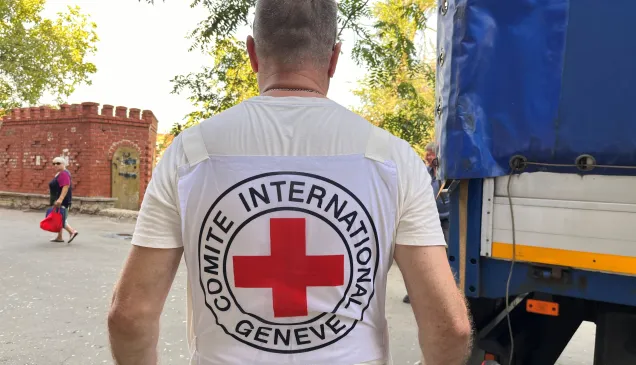Mr. Chair, Distinguished Delegates, Colleagues,
The International Committee of the Red Cross (ICRC) counts more than 130 armed conflicts ongoing now – twice as many as fifteen years ago.
Today, wars are also lasting longer and growing more complex, trapping generations in cycles of death, destruction and displacement.
In this reality, respect for international humanitarian law and rapid, unimpeded humanitarian access are not optional ideals – they are the foundation for saving lives and keeping a path to peace.
As the Third Committee begins negotiations on a wide range of resolutions, the ICRC urges your steadfast commitment to the norms and principles that protect civilians caught in conflict and make humanitarian action possible.
Universal Commitment
All parties to armed conflict must comply with international humanitarian law – this is a universal obligation.
The principles are clear: civilians and those no longer taking part in hostilities must be protected; humanitarian relief must be allowed and facilitated; and medical personnel and services must be respected and supported.
IHL – the rules of war – sets limits on the way wars are fought, preserving our humanity and the pathway back to peace. States bear the primary responsibility to translate these obligations into national law, doctrine, and practice.
This universal pact among States relies on trust and consistent, good-faith commitment.
In today’s information environment, that trust is increasingly undermined – including by harmful information that distorts realities on the ground, stigmatizes communities, and erodes acceptance and security for humanitarian action.
Harmful Narratives: Misinformation, Disinformation, and Hate Speech
The ICRC observes with deep concern the growing influence of harmful narratives in shaping the conduct of warfare.
Such narratives sow division, cause suffering and fuel violence, undermining respect for humanitarian actors and for IHL itself.
We urge all States to counter harmful narratives, promote accurate humanitarian communication, and support fact–based information that protects rather than endangers.
The same logic applies to other violations that tear at the fabric of societies, including sexual and gender–based violence.
Sexual Violence
Sexual violence continues to be widespread in armed conflict, with devastating physical, psychological, and social consequences that reverberate across families and communities over generations.
Sexual violence is prohibited under international law, including IHL, in all circumstances. It must be prevented, and survivors must receive the medical care that they require.
Serious violations of IHL, including acts of sexual violence, are war crimes which must be investigated and, if appropriate, prosecuted. Sexual violence, as with other IHL violations, is also a driver of displacement– one of the most visible and enduring consequences of armed conflict.
Displacement
Armed conflicts are the leading cause of displacement worldwide. Yet displacement could be reduced if the rules of war were respected by all parties to armed conflict.
We urge States to strengthen protection for displaced persons, including refugees, to respect family life as far as possible, and to facilitate the Red Cross and Red Crescent Movement’s work to protect family links.
Indeed, for countless families, displacement is not the end of their suffering – it is the beginning of a long and painful separation. Conflict leaves behind not only the displaced, but also the missing.
Missing Persons
For families of the missing, uncertainty is a form of suffering. IHL obliges all parties to prevent disappearances; to search for, collect, and evacuate the dead without distinction; to account for the missing; and to share any information with families.
The dead must be treated with dignity and respect. States should acknowledge and comprehensively address the needs of families of missing and deceased persons, who often face psychosocial, economic, legal, and administrative challenges.
Families have a right to know the fate and whereabouts of their relatives. States have an obligation to uphold this right.
The pain of not knowing is often felt most acutely by children, whose futures are also among the first casualties of war.
Children Affected by Armed Conflict
IHL grants children special respect and protection, yet too often we continue to see them unlawfully recruited, separated from their families, deprived of education, and exposed to horrific violence.
The ICRC calls on all States to:
Put in place robust domestic legal frameworks for protecting children in armed conflict, and endorse and implement higher standards as a matter of policy;
- Safeguard access to education, including in times of conflict;
- Take steps to prevent the recruitment and use of children by armed forces and groups, including online;
- Facilitate the release and reintegration of such children into their families and communities;
- Ensure that children affected by armed conflict are treated as victims first and foremost, and that the perceived or actual association of children with non-state armed groups, including those designated as “terrorist,” is never invoked to justify erosion of their rights and protections.
Childhoods are irrevocably changed by conflict. But States have the power to protect children from the worst of war and support their recovery once the fighting stops.
Persons with Disabilities
Persons with disabilities face disproportionate barriers in conflict – from inaccessible information, shelters, evacuations, food distributions, to disrupted medical assistance.
IHL and the Convention on the Rights of Persons with Disabilities require that measures for the protection of civilians as well as humanitarian action be disability-inclusive by design.^
The ICRC urges all actors to integrate disability inclusion in planning, data collection, and resource allocation – ensuring that no one is left invisible or unaccounted for in humanitarian response.
True humanity leaves no one behind.
New Technologies: AI, Cyber Operations, and Autonomous Systems
Humanity must also guide the way we look to the future. Warfare is being reshaped by emerging technologies – from artificial intelligence and autonomous weapon systems to cyber operations.
One question remains constant: how to ensure that human control and judgement are preserved in all decisions that pose risks to the life and dignity of people affected by armed conflict.
Technology must serve humanity – not outpace it.
Food Security and Starvation
Starvation of civilians must never be used as a method of warfare. Objects indispensable to the survival of the civilian population enjoy specific protection under the law.
Yet in many conflicts today, people go hungry and thirsty as their crops are deliberately destroyed and their access to food and water supplies and humanitarian aid is obstructed or manipulated in ways that violate IHL.
We call on States to:
- Ensure respect for IHL to help safeguard food security and prevent famine;
- Address food insecurity holistically, including its effects on health, nutrition, and safety; and
- Adapt support to meet the specific needs of different groups.
Protection of Medical Personnel as well as of Humanitarian Personnel
In armed conflict, medical staff, and humanitarian personnel more broadly are afforded distinct protection under IHL. Yet they are too frequently harmed, threatened, detained, or killed while performing duties the law explicitly safeguards.
A wounded person’s right to care – and a doctor’s duty to treat – must be recognized, always and everywhere. When relief operations are obstructed, the result is not only suffering – it is systemic denial of assistance to entire populations. This makes the question of humanitarian access as urgent as ever.
Humanitarian Access
Across numerous contexts, relief convoys are delayed or denied; bureaucratic procedures obstruct deliveries; and consent for impartial relief is withheld for political or military reasons. This costs lives.
Under IHL, parties must allow and facilitate rapid and unimpeded passage of impartial humanitarian relief to civilians in need, subject only to temporary control measures.
We call on all States to simplify procedures, issue predictable authorizations, and adopt humanitarian exemptions in sanctions and counter–terrorism frameworks.
Mr. Chair,
Across all these domains, one truth endures: the immense suffering we see in today’s conflicts is not inevitable. Respect for IHL and humanitarian access can prevent and respond to the worst consequences of war.
They protect civilians from the direct and indirect effects of violence, preserve human dignity amid devastation, and enable principled humanitarian action where it is needed most. These commitments must be urgently and unconditionally upheld in practice.
The ICRC therefore encourages all delegations to:
- Integrate IHL and humanitarian access provisions throughout appropriate Third Committee resolutions and debates;
- Support national implementation through training, doctrine development, and dissemination of IHL;
- Engage with the ICRC in dialogue, technical assistance, and coordination – whether at field level or here at the UN; and
- Promote coherence between human rights, humanitarian, and peace agendas, ensuring that the most vulnerable are not left behind.
In closing, allow me to restate that respect for the rules of war is a shared responsibility among States.
When IHL is upheld, civilians are protected, human dignity is preserved, and the path toward peace remains open.
When it is disregarded, no humanitarian response can compensate for the loss of our common humanity.
As this Committee advances its deliberations and negotiations in the weeks ahead, the ICRC requests all delegations to uphold these principles – respect for IHL, protection of civilians, and unhindered humanitarian access – as guiding references.
The ICRC remains committed to working with you – firmly neutral, deeply humanitarian, and unwavering in its mission to alleviate suffering in armed conflict.
Thank you, Mr. Chair.




